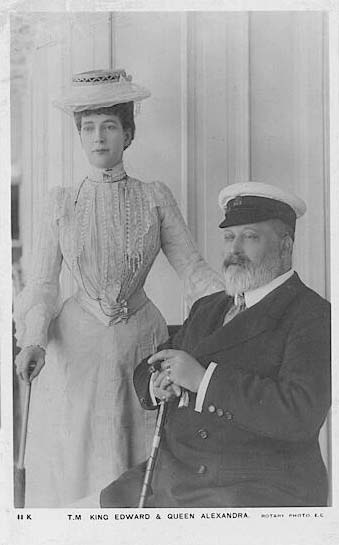
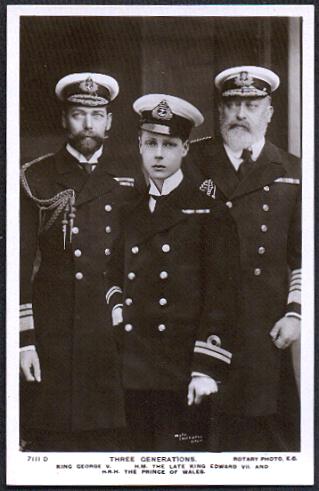
On May 1902, a treaty of peace was signed in Pretoria which pugyt an end to the Boer War which had lasted since 1899. After signing the peace, Prime Minister Lord Salisbury decide to resign; he had occupied both charges of Prime Minister and Foreign Secretary at the same time, which had been a burden for him, and although he had left the Foreign Office in 1900 (being replaced by Lord Landsowne), he was to tired to continue leading the Government. Without notifying his collegues, on July 11, 1902, he went to Buckingham Palace to see the King and presented his resignation. King Edward sent for Arthur Balfour, leader of the Conservative group in the House of Commons, and asked him to lead the Government. Lord Salisbury died on August 20, 1903.
Bertie's Coronation ceremony would take place on June 26 1902. since early June some foreign dignataries began to arrive in London and in the whole nation everyone was preparing to celebrate the new King's Coronation.
On June 14, King Edward and Queen Alexandra went to Aldershot to review some troops; the weather was cold and rainy and that night the King complained of pain and uneasinness. The next day the King was to remained in bed. In order to avoid alarming the public, a medical bulletin report that the King had only an attack of lumbago caused by a cold; but Bertie was still in great pain. Alix replaced her husband in all official and public appearences and it was suggested that the Coronation should be postponed. But Bertie said he would not even hear of such idea; the Coronation must be celebrated when it was planned. "I will go to the Abbey, he said, tough it kills me". The King and the Queen returned to London driving in semi-state. The King was feeling ill but he refused to abandon the drive; he didn't want to dissapoint the crowd that had gathered along the route to cheer their King.
Three doctors arrived to Bukingham Palace to examine the King and they dicovered the King had a severe attack of appendicitis and had to be urgently operated. King Edward refused; he argued he had to attend his Coronation. At last he was convinced; he allowed himself to be put to bed and given a sleepin drought. The operation was performed on June 24, 1902 by Sir Frederick Treves and the Coronation posponed to a date between August 8 and August 12. After the King recovery, the Coronation was finally held on August 9.
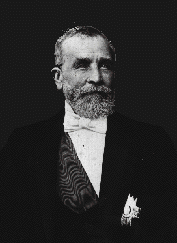
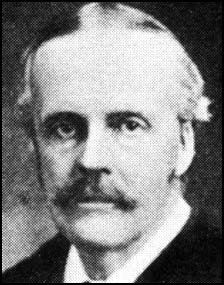
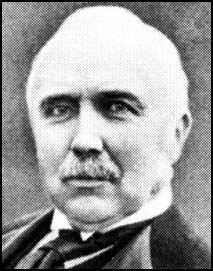
(1899-1906)
In the spirng pf 1903, King Edward planned a cruise by the Mediterranean, with stops in Portugal and Italy; he himself decided that on his way back to England, he would stop in Paris to pay a visit to the French President, Emile Loubet, who, as Bertie, hoped for an Anglo-French alliance. Loubet declared with enthusiasm that "a visit of the King would do an amount of good, which is probably nor realized in England... In this capital, His Majesty, while Prince of Wales, had adquired an eceptional personal popularity".
After visiting King Carlos of Portugal and KIng Victor Manoel III of Italy, on May 1st. 1903, wearing the scarlet uniform of a British Field-marshall, with plummed hat, King Edward descended from his privtae railway at the Bois-de-Boulogne station in Paris; he was personnaly received by President Loubet.
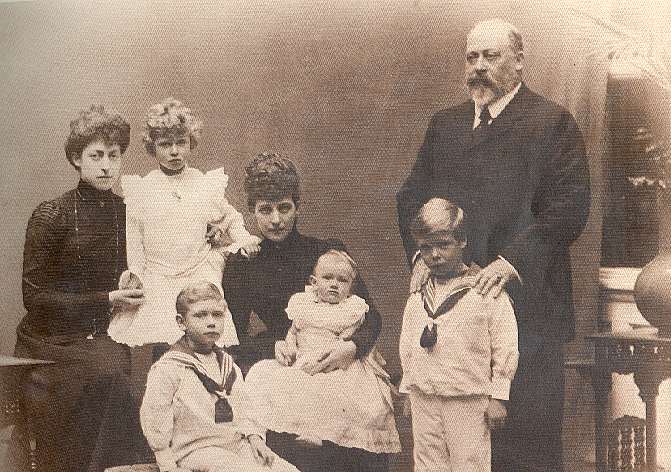
The next morning the King attended a military review in Vincennes and on his way to it, he continued smiling and saluting every French falg and any French officer he saw. At the Hotel de Ville, he pronnounced a little speech: "I would never forget my visit to this wonderful city and I can assure that always return to Paris with a greta pleasure since here I am treated exactly as if I were at home". His words spre4ad across the city and when he departed , on May 4th, the crowd had changed their attitude and cheered the King with enthusiastic shouts of "Vive le Roi", instead of "Vivent les Boers".
In early June, President Loubet and Teophile Delcass�, the French foreign Minister, paid a return state visit to England. They visited Windsor Castle and reviewed troops at Aldershot, where on the King's instructions, the Army Band played "The Marseillaise". The talks for a possible allinace between France and Greta Britain , continued for nine months, held by Lord Landsowne and Delcass�. On April 7, 1904, Bertie's dream became reality when the Anglo-French alliance was signed; it was called the Entente Cordiale.
Until 1905 Admiral John Fisher had been the main reformer of the British Navy; on October 21 he became First Sea Lord. King Edward and Queen Alexandra were personnally fond of him and admired him. The most important act he developed was the building of HMS Dreadnought which embodied the supreme concept of a battleship. When the ship was ready, Fisher invited King Edward to launch it at the docks of Portsmouth. When the Kaiser learned about the Dreadnought he was surprised and disturbed. The Dreadnought was infinitevely superior to all of German battleships and altough the rest of the British fleet was also inferior (for which Fisher was severely critized) Wilhelm and his Grand Admiral of the German Navy, Alfred von Tirpitz, feared about British naval superiority so they began to build dreadnoughts too. But when Germany had built a single dreadnought, Britain had already five more. This was the beginning of an uncontrallable race between Great Britain and Germany for Naval supremacy, which would only stop until the First World War.
On Monday December 4th 1905, Prime Minister Balfour, tired of politics and suffering from brocnhities and phlebitis, went ot Buckingham Palace to see the King and presented him his resignation. The General Elections had given the majority to the Liberal Party, so King Edward called Sir Henry Campbell-Bannerman and asked him to form the Government. Campbell-Bannerman guided his policy towards improvements in socila services, as housing and attention to unemployees.
Bertie supported his Prime Minister on the improvements of social services but he dissented with him in other matters such as limiting the prerrogatives of the House of Lords, which was one of Campbell-Bannerman's projects. The King even commented: "I hoped the Prime Minister havebn't abolished the House of Lords before I return from Biarritz".
Anglo-Russian relations had been bad since Queen Victoria's times; with King Edward's accesion to the throne things did not improved. They worsened when Great Britain supported Japan during the Russo-Japanese War in 1904 and she was aout to go to war when the Russian fleet in the Baltic accidentally fired against British fishing boats. It was until 1906 when there was chance of improving realtions between both countries.
In his first speech as Prime Minister, Campbell-Bannerman said that the new Government had "nothing but good feelings for the Russian people" and Sir Edward Grey, who had replaced Lord Lansdowne as Foreign Secretary, assured the Russian Ambassador in London, Count Alexander Beckendorf, that the new Liberal Government hoped for a resolution of difficulties with Russia.
In October 1906, the Russian Minister of Foreign Affairs, Alexander Isvolsky, visited Paris. When Bertie, who was in Scotland, learned Isvolsky was in the French capiutal, he showed anxious to see him. He had previously met the Russian Minister in 1904 in Denmark, while visiting his father-in-law, King Christian. Isvolsky was then Russian Minister to the Danish Court. King Eward was pleased by Isavolsky's derential treatment and he told him that he hoped England and Russia could one day smooth out their differences, as England and France had done. Now in 1906, the King invited Isvolsky to join him in London, where he would travel inmediately for Scotland. The Russian Minister felt honoured when he knew that the King was specialy travelling from Scotland to London in order to see him, so he inmediatelty took a ship to England. The two men met at Buckingham Palace and their conversation helped to smooth the way for the Anglo-Russian negociatons to reach an agreement between both countries. The success of the interview also solved a famly matter for Queen Alexandra: her sister Dagmar, now Dowagewr Empress of Russia and mother of Tsar Nicholas II, hadn't visited Alix in London fior 34 years because of political reasons. Now that tyhe relations between Russia and England had improved, Dagmar could traveled to England with great joy.
The British were still having some doubts about an alliance with Russia; they remembered the Bloody Sunday when thousands of Russians had died at the hands of the Imperial Guard and the dissolution of the Duma by Tsar Nicholas, which dissented with the ideas of Parliamentary England. King Edward, who wanted to cosolidate the alliance, had an idea to banish such doubts. At his instance a visit of a Russian naval squadron to Porthsmouth was organized and the officers and men where cheered by the British people in the streers of London. On August 31, 1907, the British Ambassador in Russia and Isvolsky signed an agreement at the Russian Foreign Ministry. It was not a treaty of allinace and there were not military clauses; his main purpose was to eliminate frictions between the two empires. King Edward signed on September 23 1907.
During the winter 1907-1908, Bertie's bronchitis worsened burt he refused to give up smoking.; his cough was alarming and he even had troubles while breathing. When the Biarritz season arrived, the doctors recommended him to remain there at least for six weeks in order to help his lungs to recover. The King wento to Biarritz, as always accompanied by Alice Keppel.
While Bertie was in Biarritz a political crisis developed in England. Prime Mnister Campbell-Bannerman became very ill and he sent the King a message telling him he would have to resign. The assignation of a new minister would force Bertie to return and he didn't want to, not because of hisa health, but because he did not want to leave Alice Keppel so soon, so he ordered Campbell-Bannerman not to resign until Easter, when Bertie would be already at home.
But the situation was compelling; the Government was paralysed as Campbell-Bannerman was so ill that he couldn't even attend the offcial affairs. He died three weeks later. It was decided that Herbert Asquith would replaced him and as the King refused to come back, the new Minister would have to go to Biarritz to fullfiled the tradition of kissing the King's hand and ask for his approvement for the appointment of the new Cabinet. Asquith arrived at Biarritz on April 8th and King Edward was severely critisized for his anti-constitutional attitude.
Despite his weak health, the King travelled that same year to Sweden, Norway and Denmark, accompanied by Queen Alexandra.. The Anglo-Swedish relations were not good since Engalnd supported Norway to get its independence from Sweden in 1905; in fact King Edward's youngest daughter, Maud, was Queen of Norway by her marriage to King Haakon VII. It was the first tie that a British sovereign visited Stokholm, where a banquet was offered to honoured the King and Queen of England. On April 20, Bertie and Alix left for Norway and Denmark, where they could visit they daughter in Oslo and Alix's family in Denmark. The result of these visits was the signing of the Baltic and North Seas agreement.
When the King returned to London, he began to planned a trip to Russia. Alix was delighted with such idea since it would made possible a visit to her sister. But there was somo opposition to the Russian trip among the Labourist members of the House of Commons; James Ramsay MacDonald, leader of the Labourists, had even called the Tsar a "vulgar murderer". Despite this opposition, Berrtie achieved his objective and he departed for Russia on June 6. He was accompanied by Alix, their daughter Victoria, the loyal lady-in-waiting, Charlotte Knollys, and Admiral Sir John Fisher, among others. The trip was made on board the Royal yatch Victoria and Albert. Whent the yatch passed through the Kiel channel, they were recieved by five five new dreadnoughts, all elighted, followed by five smaller ships. Kaiser Wilhelm had made this grear demonstration of his German fleet only to surprised his uncle. He sent his brother, the Grand Admiral Prince Herny of Prussia to salute the King who saw himself in the compromise of landing in German soil and reviewed some troops.
The King and his party continued they journey to Russia. When they entered the Gulf of Finland, near the coast of Reval, they were received by the two Russian Imperial yatchs, the Standard and the Polar Star. King Edward, Queen Alexandra and their party joined the Imperial family on board the Polar Star were they had lunch and drank champagne, and when the band began to play, Admiral Fisher danced with the Tsar's sister, Grand Duchess Olga. The next day King Edward offered Tsar Nicholas the rank of asdmiral of the British Royal Navy, which he acceprted with a smile. Withe the Russian visit the King had strenghten the British alliance with this country and extended the Entente Cordiale into a tgriple alliance between England, Russia and France.
By early 1909 the King's helath had worsened even more. But alhough his nights of cough and a constant incresase in weight , he still refused to obey his doctors. His Ministers were pressing him to made an official visit to Germany since during hios eight years of reign he had payed state visits to many European capitals but to Berlin he had only attended on informal or familiar visits and the Kaiser had mentioned the fact keenly.
At his return to England bertie's health continued poor; his cough persisted and breathed with difficulty. By this time Prime Minister Asquith and his Chancellor of the Exchequer, David Lloyd George created their "People's Budget", which was attempt to redistribute wealth. The Conservative majority at the House of Lords objected to the budget; this was the last political crisis of King Edward's reign and he would not live to see it solved.

On Thursday May 4, when his secretary Ponsonby brought him some papers to sign, the King said: "I feel wretchedly ill. I can't sleep. I can't eat. They really must do something for me. That same afternoon Queen Alexandra arrived at Calais; it was the first time she was not receive by her husband when comming form abroad.
The next day, Friday May 6, the King received his friend Sir Ernest Cassel. Through the afternoon he suffered a series of heart attacks and the doctors declared it was the end. He had moments of consciousnness during which he recieved the visit of Alice Keppel, whom the Queen had generously sent for. At 5 pm. Prince George informed his father that one of the King's horses, Witch of the Air, had won a race at Kempton Park. "I am very glad" said the King. Soon after, he sank into coma. He died at 11:45 that night.
King Edward VII had reign only nine years. During his short reign he achieved to take England out of her splendid isolation by alliances with France and Russia, by which he has spread the peace through Europe. He was known as "The Peacemaker".
Alix felt a terrible pain at her husband's death.She only wanted to leave London and refuge herself in Sandringham, but she had to remain until the end of the funeral. It was difficult for her to accept that she was now only teh Queen Mother and George and May were the new King and Queen. On December 1910 she left Buckingham Palace to return to Marlborough House. She also remained living at Sandringham in the company of her daughter Victoria and of Charlotte Knollys.
During the following years Alix presenced the Worl War I, the Russian Revolution, the murders of his nephew the Tsar and his family and her sister's Dagmar's departure from Russia on March 22, 1917.
By 1919 the Queen Mother's health began to decline. Her deafness had increased and her mind was confused. Neither in May 9, 1919 when her sister Dagmar visited England, Alix's mind seemed to react.
Queen Alexandra died of a heart attack on November 20, 1925. Only King George and Queen Mary were at her bedside when she quietly stopped breathing.